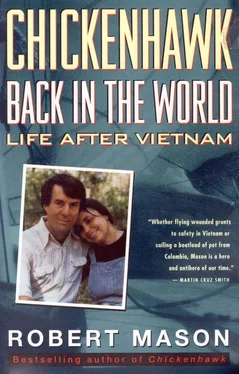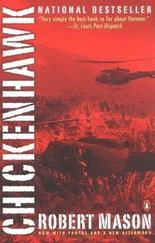Robert Mason - Chickenhawk - Back in the World - Life After Vietnam
Здесь есть возможность читать онлайн «Robert Mason - Chickenhawk - Back in the World - Life After Vietnam» весь текст электронной книги совершенно бесплатно (целиком полную версию без сокращений). В некоторых случаях можно слушать аудио, скачать через торрент в формате fb2 и присутствует краткое содержание. Год выпуска: 2013, Издательство: BookBaby, Жанр: Старинная литература, на английском языке. Описание произведения, (предисловие) а так же отзывы посетителей доступны на портале библиотеки ЛибКат.
- Название:Chickenhawk: Back in the World - Life After Vietnam
- Автор:
- Издательство:BookBaby
- Жанр:
- Год:2013
- ISBN:нет данных
- Рейтинг книги:3 / 5. Голосов: 1
-
Избранное:Добавить в избранное
- Отзывы:
-
Ваша оценка:
- 60
- 1
- 2
- 3
- 4
- 5
Chickenhawk: Back in the World - Life After Vietnam: краткое содержание, описание и аннотация
Предлагаем к чтению аннотацию, описание, краткое содержание или предисловие (зависит от того, что написал сам автор книги «Chickenhawk: Back in the World - Life After Vietnam»). Если вы не нашли необходимую информацию о книге — напишите в комментариях, мы постараемся отыскать её.
Chickenhawk: Back in the World - Life After Vietnam — читать онлайн бесплатно полную книгу (весь текст) целиком
Ниже представлен текст книги, разбитый по страницам. Система сохранения места последней прочитанной страницы, позволяет с удобством читать онлайн бесплатно книгу «Chickenhawk: Back in the World - Life After Vietnam», без необходимости каждый раз заново искать на чём Вы остановились. Поставьте закладку, и сможете в любой момент перейти на страницу, на которой закончили чтение.
Интервал:
Закладка:
That afternoon at the mess hall, Leone came over and sat at my table. Leone never sat with me; I wasn’t in his clique of friends, they being mostly Mafia and other serious crooks. My being a writer and small-time pot smuggler was okay, but it certainly wasn’t something you’d want to brag about. My impression was that Leone thought I was the straightest wimp he’d run into. He once accused me of running the commissary like I owned stock in it. Leone sat down, grinning. He leaned over his tray and said, “Bob. That was really something. Now, now I respect you.”
It had been a long twenty months. It was actually ending? Knox had written me earlier, comparing my incarceration with his collection of tropical fish. He said, “I got some guppies just for movement, and now they’ve given birth, so the population rises—and none of these guys get out on weekend passes. Ever. The only way they leave is fins first.” I was leaving, and I was still alive.
I was grinning to myself when Tarzan walked by with his flashlight. I stood up and watched him checking each cube on my aisle. He walked back to me. “Ready?” Tarzan said.
“Yeah. I’m ready.”
He shined his light around inside my cube. “All cleaned up?”
“All cleaned up.”
“Okay, grab your sheets and stuff.”
I picked up the two pillowcases and followed Tarzan out the door.
Dawn was a faint glow in the east. I followed Tarzan over to the clothing room and dumped the pillowcases into the piles of clothes in the bins. Then we walked together up the long sidewalk to the administration building. Tree frogs croaked, crickets chirped. Our footsteps crackled sand on the sidewalk. Tomorrow, and for all tomorrows, an inmate would be sweeping it clean. I looked around as I walked, trying to memorize the scene: the shadow of a huge oak barely perceptible against the early glow of dawn; dim lights in dorms filled with seven hundred and fifty sleeping men; Tarzan strolling ahead of me, still unapproachable after almost two years; men moving as shadows against dim lights inside the guard shack. I didn’t want to forget any of this.
Tarzan didn’t talk. Of all the hacks I’d known, Tarzan had the least to do with the inmates. “I’m sure going to miss this place,” I said.
“Sure,” Tarzan said.
CHAPTER 34
After an eight-hour ride from prison, I met Patience at the bus station in Ocala. You can ride home in your car on furloughs, fly if you want, but you have to take the bus when you leave. Technically, you’re still in custody when you’re transferred from the prison to the halfway house. It’s a rule.
We drove to the address and found a white brick house with a sign out front that said SALVATION ARMY. When I saw this, I began to have regrets that I’d fought so hard to get a four-month halfway house. The counselors said I already had a job. The idea of the halfway house was to help a convict get a job and get back into society. I had argued that I couldn’t live forever on one book, I really had to get back to work, try to write another book. They gave me the halfway house. Now, looking at the Salvation Army building, I began to have doubts.
A woman inside showed me the bunk room where I’d be staying five nights a week for the next four months. The room was down the hall from where the normal clients of the Salvation Army, the homeless and destitute, stayed. There was room for ten men in the bunk room which the Salvation Army provided on contract with the state and federal prison systems. The bunks were equipped with lumpy, plastic mattresses.
The woman said I’d have to go check in with the head of the place. Captain Eugene Gerber, at his office in another part of town. Patience and I drove to Gerber’s office.
Gerber knew all about me. He sat behind his desk under a picture of Jesus Christ and lectured me and Patience for two hours about the kind of “ship” he ran. He was a Navy veteran, a sailor. Now he was captain of the local Salvation Army. Gerber ran a tight ship.
Gerber read from a whole list of regulations: I’d have to be at the Salvation Army every night by ten except Friday and Saturday night. On weekends, the felons got passes if we hadn’t fucked up by breaking any of the rules. I was to keep my bunk straight; I’d also be responsible for keeping the bathroom clean; I was subject to random urine checks, which, if I failed, would send me back to prison. I could, however, drink if I didn’t get drunk. Gerber had more regulations than Eglin, and read them all. Finally he said I had to get a job.
I said, “Captain Gerber, I have a job. I’m a writer.”
“I’ve heard. Do you get a paycheck every week?”
“No. Writers usually get paid twice a year. Royalty payments.”
“I have to see a paycheck every week,” Captain Gerber said.
I was about to say I’d made a hundred and eighty thousand dollars in less than two years, but I knew that would only piss him off. So I said, “I’ll get a paycheck every week.”
“Fine. Where will you work?”
I’d heard I might run into this problem, so I’d already called Knox about it. “I’ll be working for my agent, at home.”
Gerber nodded. “That’s okay with me. Have him send me a letter saying you’re employed by him. I want to see a Xerox copy of each paycheck, each week. Also, keep in mind that you have to check in here before six every day.”
“I thought you said I’d have to be here at ten.”
“That’s right. But we have to see you punch in at the time clock after work. You’re free from then until ten.”
“I live in High Springs, Captain Gerber. That’s sixty miles from here. Couldn’t I just call you and tell you I’m finished working for the day?”
“No. I have to see that card punched every day. Before six.”
This guy was going to show me what power was all about. I already knew one guy in Gerber’s halfway house, a former inmate from my section at Eglin, who worked in Gainesville, thirty miles away, and he didn’t have to check in after work. There was no way around this guy—it was a rule. He was simply being selective about enforcing it. I could feel my face getting red. I said, “Fine. Is that all?”
Gerber smiled. “Yes. You follow the rules to the letter, Mr. Mason, and we’ll get along just fine.”
On the way to a restaurant in Ocala, I went into a rage and told Patience I wanted to go back to prison, where people were reasonable. Patience said I didn’t love her, and I shut up.
I fell into a new daily routine: I got up at five-thirty in the felon’s bunkhouse, made a cup of coffee in the kitchen, got into our Escort, and drove sixty miles to High Springs. I stopped off at my parents’ at six-thirty and had coffee. My dad was improving. He couldn’t walk or use his right arm, but he was talking well enough to understand. My mother wanted to sell the farm and move to Gainesville, closer to the doctors.
By seven-thirty, I was home. I’d make Patience a cup of coffee, drink another cup myself, read the paper, and be at work by nine. I worked on my robot book in the attic of our cabin. Patience had bought a computer while I was in prison, so now I had a new way to write. I trashed the manuscript I’d carried with me for two years because, as Knox said, it wasn’t “up to the standards you set in Chickenhawk , Bob.” As a matter of fact, Knox not only hated what I’d written, he hated the idea. Knox doesn’t like science fiction, and he especially hates robot stories. That was okay. My goal was to write a robot story that Knox would like because I didn’t want the book to be considered strictly science fiction. I wanted the average reader to experience my robot as though it were real, now. Knox would be my litmus test.
I wrote from nine to twelve every day and then spent time working on the cabin. I’d left it unfinished and Patience was reluctant to have anything done until I got back.
Читать дальшеИнтервал:
Закладка:
Похожие книги на «Chickenhawk: Back in the World - Life After Vietnam»
Представляем Вашему вниманию похожие книги на «Chickenhawk: Back in the World - Life After Vietnam» списком для выбора. Мы отобрали схожую по названию и смыслу литературу в надежде предоставить читателям больше вариантов отыскать новые, интересные, ещё непрочитанные произведения.
Обсуждение, отзывы о книге «Chickenhawk: Back in the World - Life After Vietnam» и просто собственные мнения читателей. Оставьте ваши комментарии, напишите, что Вы думаете о произведении, его смысле или главных героях. Укажите что конкретно понравилось, а что нет, и почему Вы так считаете.












